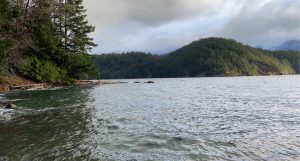Hi there!
My name is Lenaya Sampson and I will be your guide through the happenings of English 372: Canadian Literary Genres: Canadian Studies or also known as “Oh Canada” by our instructor Erika Paterson. I am from the Nlaka’pamux Nation from a small town located where the Thompson and Fraser Rivers meet and have already completed one degree in English Literature and Human Geography. As an indigenous student attending UBC, I am excited to continue studying colonial narratives and representations that are placed upon Indigenous people in Canada. Through this course, I would also like to further develop my research and writing skills to better express myself around issues that are very important to me such as the ones presented here. In this course, I am looking forward to expressing myself in different methods such as blogs, response posts, a term paper, dialogue and the conference presentation.
Some things that excite me about this course, in particular, is studying stories in literature and the stories about literature and whose stories we listen to and the stories we do not listen too like Paterson stated in her introductory Vimeo video. These statements are important to me because being students at UBC we often hear the colonial side of the story. I believe to be a well-rounded citizen you need to know both sides and the implications that these stories have on society even in today’s times.
Overall, I am very excited to be a participant in this course (even though it is my last English requirement) as I believe it will help develop my analytical skills, creative side of writing and my digital literacy. I also wanted to add one where I am from and another that will connect people to a podcast I like listening to that discusses issues from and Indigenous POV. I am looking forward to taking you along on this journey with me!
All the best,
Lenaya Sampson
Works Cited
Media Indigena. Who we are. Patron. https://mediaindigena.com/about/. Accessed 13 January. 2021.
British Columbia. Lytton. http://britishcolumbia.com/plan-your-trip/regions-and-towns/vancouver-coast-mountains/lytton/. Accessed 13 January. 2021.

This is a photo a took during one of my adventures through Skwxwú7mesh territory. It is somewhere that I know has many stories that were told and written in ways that disregarded the Skwxwú7mesh people.

Hi Lenaya. Thank you for your wonderful post introducing us to you and the places dear to you. Thank you also for sharing the beautiful photo. I appreciate the attention you draw to the stories we tell about and within place. You remind me of how it was some of my first major travels–mainly to the UK, where my “heritage” is (there’s another story of origin!)–that leant me some new perspective about my “homeland” in British Columbia. I remember it being mentioned (when I was abroad) that every hill and glen in the Scottish Highlands has a story attached to it. Of course, I thought, this is true of BC too, but those are stories I don’t know, perhaps that I can’t know. Maybe, following Chamberlin, there’s room for the telling of stories old and new in finding common ground and articulating relationship with place . . .
By the by, it’s great that you’re also bringing your knowledge of human geography along on our journey! Are there ways in which that background has or might inform your thinking about literature, place, and storytelling?
All the best to you,
Connor
Hi Connor!
Thank you for the thoughtful response! I think that human geography will play a little into my understanding to this course but, I believe it will be my NITEP and Indigneous literature classes that I will be drawing on the most.
Lenaya
Hi Lenaya! I really enjoyed reading your introductory post–that photo is so beautiful. I am also quite interested in stories in/about literature and vice versa. The quote you bring up–“The stories we listen to, and the stories we don’t listen to”–actually brings to mind for me a rhetorical question I heard posed while in a UBC classroom, spoken in a similar context: “Who speaks, who is spoken for, and who is silent?” This second question is one that has stayed with me since I heard it the first time, and I often find myself thinking about it.
These quotes bring up similar concerns, both having to do with the way one’s ability to speak or listen is produced through colonial narratives and representations. You (rightfully) note how, at UBC, students are more often exposed to the colonial side of the story; I wonder if, in order to tip the scales, it would be better to focus on developing “listening” or “speaking,” as skills? Obviously, having both working in tandem would be ideal! But, I do think this could be an interesting rhetorical question, in terms of the hierarchy between audience/listener/reader and performer/speaker/writer.
Hi Grace!
Thank you for this! As I am going through the course I am finding that there is a lot of Indigenous people’s voices that are silent and we cannot hear. So we relay on writers such as King, Robinson, Maracle and other known authors to speak to the experience of being Indigneous. So I am wondering if there will ever be a way to have recognition of more Indigenous peoples.